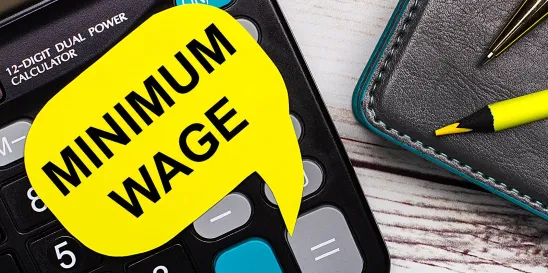The New York State Department of Labor (NYSDOL) has issued proposed regulations to align the state’s industry-specific wage requirements with the upcoming increases in the state minimum wage.
In May 2023, Governor Kathy Hochul signed into law a bill to increase New York’s minimum wage again (to $17.00 an hour by 2026), following increases enacted in 2016 as part of the “Fight for Fifteen” Initiative. The first increase (to $16.00 an hour) is effective on January 1, 2024, and subsequent changes will take effect on January 1, 2025, and January 1, 2026.
For further information regarding this and other legislation, see 2023 New York State Legislature Concludes with Flurry of Activity Pertinent to New York Employers, New York Enacts Laws on Captive Audience Meetings, Wage Theft, Gender Identity, and More New York Legislative Enactments.
As many of the industry-specific wage requirements in the New York Wage Orders are based on the minimum wage, NYSDOL has issued proposed regulations (likely to be adopted). The proposed regulations will adjust the New York Wage Orders on various issues, including credits against the minimum wage and the salary threshold excluding executive and administrative workers from “employee” status under the Wage Orders. Some of these expected changes are summarized below.
Proposed Changes to Salary Exemption Threshold
To be an exempt executive or administrative employee under New York law, the employee must be paid on a salary basis and meet the salary level threshold, in addition to meeting the duties prong of the exemption. This salary threshold is consistently higher than federal law (even under the proposed federal changes) and continues to be generally calculated as 75 times the applicable minimum wage.
The proposed amounts starting 2024 are:
For New York City, Westchester, and Long Island:
- 2024 – $1,200.00/week ($62,400.00 per year)
- 2025 – $1,237.50/week ($64,350.00 per year)
- 2026 – $1,275.00/week ($66,300.00 per year)
For the rest of New York:
- 2024 – $1,124.20/week ($58,458.40 per year)
- 2025 – $1,161.65/week ($60,405.80 per year)
- 2026 – $1,199.10/week ($62,353.20 per year)
Proposed Changes Affecting Food Service Workers Under Hospitality Wage Order
A “food service worker” is an employee other than a delivery employee who is primarily engaged in the serving of food or beverages to guests, patrons, or customers and who regularly receives tips from such guests, patrons, or customers.
The proposed modified minimum cash wage, and overtime rates, and tip credit for such employees are:
For New York City, Westchester, and Long Island:
| Eff. 1/1/2024 | Eff. 1/1/2025 | Eff. 1/1/2026 | |
| Minimum Wage | $16.00 | $16.50 | $17.00 |
| Cash Wage | $10.65 | $11.00 | $11.35 |
| Overtime Cash Wage | $18.65 | $19.25 | $19.85 |
| Tip Credit | $5.35 | $5.50 | $5.65 |
For the rest of New York:
| Eff. 1/1/2024 | Eff. 1/1/2025 | Eff. 1/1/2026 | |
| Minimum Wage | $15.00 | $15.50 | $16.00 |
| Cash Wage | $10.00 | $10.35 | $10.70 |
| Overtime Cash Wage | $17.50 | $18.10 | $18.70 |
| Tip Credit | $5.00 | $5.15 | $5.30 |
Proposed Changes Affecting Service Employees Under Hospitality Wage Order
A service employee is an employee other than a food service worker who receives tips at or above a required “tip threshold” rate of tip compensation.
The proposed modified minimum cash wage, overtime rates, tip credit, and tip threshold for such employees are:
For New York City, Westchester, and Long Island:
| Eff. 1/1/2024 | Eff. 1/1/2025 | Eff. 1/1/2026 | |
| Minimum Wage | $16.00 | $16.50 | $17.00 |
| Cash Wage | $13.35 | $13.75 | $14.15 |
| Overtime Cash Wage | $21.35 | $22.00 | $22.65 |
| Tip Credit | $2.65 | $2.75 | $2.85 |
| Tip Credit Threshold | $3.45 | $3.55 | $3.65 |
For the rest of New York:
| Eff. 1/1/2024 | Eff. 1/1/2025 | Eff. 1/1/2026 | |
| Minimum Wage | $15.00 | $15.50 | $16.00 |
| Cash Wage | $12.50 | $12.90 | $13.30 |
| Overtime Cash Wage | $20.00 | $20.90 | $21.30 |
| Tip Credit | $2.50 | $2.60 | $2.70 |
| Tip Credit Threshold | $3.20 | $3.30 | $3.40 |
Proposed Changes to Meal Credit
Meals furnished by an employer to an employee may be considered part of an employee’s wages under various wage orders. Thus, some employers take a meal credit against an employee’s wages for each shift that the employee is furnished a meal.
For New York City, Westchester, and Long Island:
| Eff. 1/1/2024 | Eff. 1/1/2025 | Eff. 1/1/2026 | |
| Food Service Employees | $3.85 | $3.95 | $4.05 |
| Service Employees | $4.45 | $4.60 | $4.75 |
| Non-Service Employees | $5.50 | $5.65 | $5.80 |
For the rest of New York:
| Eff. 1/1/2024 | Eff. 1/1/2025 | Eff. 1/1/2026 | |
| Food Service Employees | $3.80 | $3.95 | $4.10 |
| Service Employees | $4.10 | $4.25 | $4.40 |
| Non-Service Employees | $5.20 | $5.35 | $5.50 |
Proposed Changes to Uniform Allowance
Under New York law, if an employer requires an employee to wear a certain uniform, the employer can launder and maintain the uniform or pay the employee Uniform Maintenance Pay. Uniform Maintenance Pay is paid weekly and is dependent on the hours worked by the employee during the week. Under the Miscellaneous Wage Order, this allowance can be set off by monies paid in excess of minimum wage. Calculations need to be reviewed with the increased minimum wage to ensure any excess covers the allowance.
For New York City, Westchester, and Long Island:
| Eff. 1/1/2024 | Eff. 1/1/2025 | Eff. 1/1/2026 | |
| Work >30 Hours | $19.90 | $20.50 | $21.10 |
| Work 20-30 Hours | $15.75 | $16.25 | $16.75 |
| Work <20 Hours | $9.50 | $9.80 | $10.10 |
For the rest of New York:
| Eff. 1/1/2024 | Eff. 1/1/2025 | Eff. 1/1/2026 | |
| Work >30 Hours | $18.65 | $19.25 | $19.85 |
| Work 20-30 Hours | $14.80 | $15.30 | $15.80 |
| Work <20 Hours | $8.95 | $9.25 | $9.55 |
Spread of Hours; Split Shift
Under various wage orders, “spread of hours” is the length of the interval between the beginning and end of an employee’s workday (the concept also applies to “split shifts” of shorter intervals under the Miscellaneous Wage Order). Spread of hours includes working time plus time off for meals plus intervals off duty, including time off between shifts. An employee must receive one additional hour of pay at the basic minimum wage rate each day on which the spread of hours exceeds 10 hours. While under the Miscellaneous Wage Order spread obligations can be offset based on amounts paid in excess of the minimum wage (for non-overtime hours based on NYSDOL guidance), the increased minimum wage requires a review of the offset calculation. Under the Hospitality Wage Order, there is no set off and spread of hours will be owed where the provision is triggered (at the soon-to-be revised rate).
A “split shift” occurs when an employee’s working hours during the day are not consecutive, e.g., an employee who works a morning shift and then, several hours later works, an evening shift. Meal breaks during the day do not trigger a split shift. Employees covered by the Miscellaneous Wage Order who work a split shift are entitled to an additional hour at the minimum wage (soon-to-be increasing), subject to potential set offs for wages paid in excess of the minimum wage.







 />i
/>i
